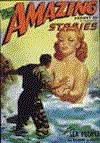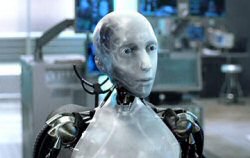|
|
|
'I, Robot' story is compelling, but it isn't Asimov's July 22, 2004 By Franklin Harris I haven't read Isaac Asimov's book "I, Robot" since college. But I'm pretty sure Asimov would not approve of the movie bearing its name. Actually, the film is based primarily on an original screenplay by Jeff Vintar titled "Hardwired." But screenwriter Akiva Goldsman, the man who gave us "Batman and Robin," has sprinkled a few of Asimov's ideas and character names into the mix. And 20th Century Fox has paid the Asimov estate for the privilege of using Asimov's good name.
Probably I should feel guilty. It's like I'm betraying dear old Isaac. But I liked "I, Robot." The movie, I mean. In the year 2035, robots are as common as wireless phones are today. They can walk the dog. They can do the laundry. They can even bake a cake. And U.S. Robotics, the Microsoft of the robotics industry, plans to put its newest, most advanced model in every household — one for every five humans. This sounds like a great plan. After all, all robots are governed by the Three Laws of Robotics, set down by Asimov in his novels, but for the purposes of the movie, formulated by robotics engineer Alfred Lanning (James Cromwell): 1. No robot may harm a human or, through inaction, allow a human to be harmed. 2. A robot must obey any order a human gives it, unless the order conflicts with the first law. 3. A robot must act to preserve its own existence unless so doing conflicts with the first or second law. It all seems so simple. Perhaps it's too simple, because as the movie opens, Lanning is dead of an apparent suicide. Except that police detective Spooner (Will Smith) doesn't believe it was suicide. He believes Lanning's death was murder. But his prime suspect is a robot, and everyone knows robots can't kill. The First Law says so. Besides, Spooner is a technophobe who wears 30-year-old sneakers and listens to 60-year-old music on a 40-year-old stereo. What does he know about robots? To discover how and why a robot could commit murder, Smith turns to Susan Calvin (Bridget Moynahan), U.S. Robotics' resident robot psychologist. Calvin has been around robots so long that she almost acts like one. Still, she makes herself useful when the suspect robot, Sonny (Alan Tudyk's voice and lots of computer wizardry), proves to be different from other robots of his make and model. Yes, there are parts of "I, Robot" that are irritating. Bruce Greenwood's character, the chairman of U.S. Robotics, is written as a stereotypical evil businessman. And a scene in which Spooner is trapped in a building as it is being demolished doesn't quite make sense. Who schedules the demolition of a fully furnished home for the day after its occupant's untimely death? No one, unless the script calls for an action scene. But the murder mystery is tightly plotted and compelling, even if most sci-fi fans will guess the killer's identity early on. And not even the "Star Wars" and "Lord of the Rings" films blend live actors and computer-generated ones so seamlessly. Director Alex Proyas ("Dark City") is known for his visual flair, and he doesn't disappoint here. His futuristic Chicago is neither a gleaming utopia nor a grim industrial wasteland. Instead, it's a believable mix of the new and the old. It's a city in which technological development is as organic as biological development. Perhaps that is the movie's point. If robots can truly be alive, then they cannot be governed by rigid laws, no matter how well intentioned. They will require the same kind of freedom humans have, even if that raises the possibility of doing evil. |

RECENT COLUMNS
Order a helping of Cartoon Network's 'Robot Chicken'
03/31/05
Campaign against video games is political grandstanding
03/24/05
Prize-winning author is 'Wrong About Japan'
03/17/05
Censored book not a good start
03/10/05
Some superhero comics are for 'fanboys' only
03/03/05
'Constantine' does well with its out-of-place hero
02/24/05
'80s publisher First Comics' legacy still felt
02/17/05
Director's cut gives new 'Daredevil' DVD an edge
02/10/05
Put the fun back into 'funnybooks'
02/04/05
Is 'Elektra' the end of the road for Marvel movies?
01/27/05
'House of Flying Daggers' combines martial arts and heart
01/20/05
Anniversary edition of 'Flying Guillotine' has the chops
01/13/05
Movie books still have role in the Internet era
01/06/05
Looking ahead to the good and the bad for 2005
12/30/04
The best and worst of 2004
12/23/04
'Has-been' Shatner is a 'transformed man'
12/16/04
© Copyright 2005 PULP CULTURE PRODUCTIONS
Web site designed by Franklin Harris.
Send feedback to franklin@pulpculture.net.
